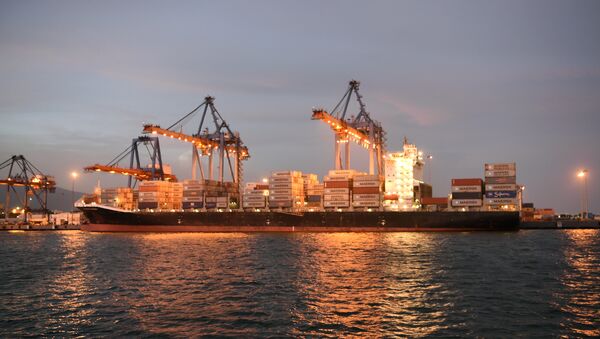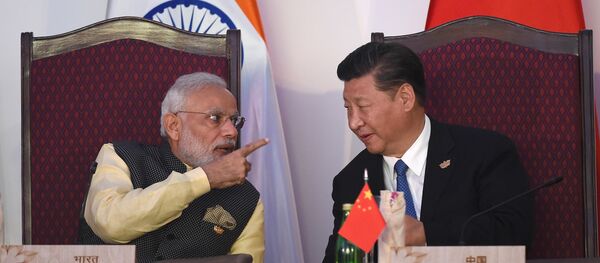Indian Prime Minister Narendra Modi has agreed to pay an unofficial visit to Wuhan in central China and meet with Chinese President Xi Jinping on April 27-28, according to a statement released following a meeting of foreign ministers of both nations last Sunday.
The latest sign of warming ties between Beijing and New Delhi came as a surprise, as Modi has taken a strong stance against China since taking office in May 2014. While neighboring countries in the region, including Pakistan, Nepal and Bangladesh, have all endorsed China’s One Belt One Road (OBOR) Initiative, a massive infrastructure and trade program pioneered by the Chinese president, India continues to be one of the few holdouts in the region.
READ MORE: India to Establish Air Corridor With Landlocked Mongolia to Boost Trade
When tensions arose last year over the disputed border area of Doklam (Donglang in Chinese) near the Sikkim state, where New Delhi supports Bhutan’s territorial claims, Modi’s firm response and Beijing’s stern position led to an almost 10-week military standoff between the two nations.
Both Benefit From Globalization
Facing Modi’s assertive foreign policy, China refused to make concessions in any dispute with India and avoided showing weakness in bilateral relations. However, as Beijing faces increasing pressure from the United States in a bitter trade dispute, China could find common ground with India on global trade issues, political analysts suggested.
"China wants to mend fences with India because there is the Trump administration threatening a trade war, which could also have a huge impact on India. That’s because this is part of globalization. Leaders of both countries endorse globalization and are against trade protectionism, which would be a threat to both nations. As new entrants into globalization, they [China and India] are both benefiting from exports and imports. This could possibly explain why China is interested in hosting this informal meeting," Srikanth Kondapalli, a professor in Chinese studies at Jawaharlal Nehru University in New Delhi, India, who wrote a book on China’s One Belt One Road initiative, told Sputnik.
The Indian scholar explained that New Delhi accepted the olive branch from Beijing because reducing mutual distrust could help India ensure border stability with its stronger neighbor.
"The situation on the border [between China and India] is more comfortable for the Chinese side, because its comprehensive national power is 3-4 times bigger than India. China has a dominant military position in Tibet, both in conventional and nuclear missile capabilities. Border stability may or may not be a big concern for China, but it’s a major concern for India. The Doklam incident exposed the vulnerabilities in bilateral relations. The mutual distrust has increased and stayed at a high level. The informal meeting could lead to more understanding in each other’s positions," he said.
Key Difference Remains
Three days before Modi’s visit to China, India once again failed to express support for the OBOR Initiative in the statement released after the foreign ministers’ meeting of the Shanghai Cooperation Organization (SCO) nations in Beijing. All the other foreign ministers from the SCO nations reaffirmed their support for the OBOR Initiative.
READ MORE: Will Beijing Manage to Survive the US-Chinese Trade War?
Professor Kondapalli stressed that China needs to address India’s sovereignty concerns over the disputed area in Kashmir before New Delhi could consider joining the China-led infrastructure initiative.
"The current Chinese position is that the China Pakistan Economic Corridor (CPEC) is the flagship program of the OBOR Initiative. The CPEC project passes through Gilgit-Baltistan in Pakistan, which the Indian Constitution mentions as part of India’s territory. The Indian side is basically saying ‘how can you construct a road or a hydroelectric dam in my land?’ If China is sensitive on Tibet and Taiwan and asks everybody else to sign the One China Policy, how can China ignore India’s sovereignty claim? The Indian position is moderate compared to China’s own strong position on sovereignty issues," he said.
However, Chinese scholars argued that it is impossible for China to change its position on the CPEC project and called on India to avoid politicizing a purely economic project.
"China’s OBOR Initiative is focused on economic cooperation and is not related to any political or sovereignty issues. The CPEC project was confirmed after prolonged negotiations between China and Pakistan. It’s unrealistic to change the route of the CPEC just to satisfy India. It’s also impossible for China and Pakistan, both sovereign nations, to change their bilateral agreement because of a third sovereign nation. The CPEC is an economic project, which is not related to politics. It’s unnecessary for India to be overly concerned about it," Hu Zhiyong, a research fellow at the Institute of International Relations of the Shanghai Academy of Social Sciences, told Sputnik.
Hu believes it is unlikely for Modi and Xi to reach a consensus on the OBOR Initiative after their meeting on Friday.
Modi's Political Career
Improving bilateral relations with China could be beneficial to Modi’s political career in the future, as he faces a lot of challenges in the upcoming elections in India in 2019, the Chinese scholar pointed out.
"Modi’s policy toward Beijing is flawed because he always views China a strategic rival for India. That’s why he has taken a confrontational position [against China] on various issues. If he doesn’t change this kind of policies, it could further deteriorate bilateral relations between the two nations. This could also bring him troubles and hurt his chances to be reelected during the upcoming election in India in 2019. Modi needs to understand this and adjust his China policy accordingly. By cooperating with China, India could also benefit from the OBOR Initiative," Hu said.
Similar to resolving the border dispute with India ahead of the BRICS Summit held in China last year, Xi decided to meet with Modi again as part of the nation’s efforts to build a positive mood before hosting the SCO Summit in Qingdao in June, the Chinese expert noted.
The views and opinions expressed by the speakers do not necessarily reflect those of Sputnik.




